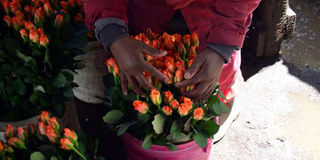Boost for horticulture as new system set to improve quality

A worker packs flowers for export in Finlays Horticulture Kenya Ltd farm in Naivasha. An automated cloud-based system will make it possible for any shipment that does not comply with market standards on arrival in the export market to be traced back to the source. PHOTO | SULEIMAN MBATIAH | NATION MEDIA GROUP
What you need to know:
- The move is expected to build confidence in the Kenyan brand and even open new markets to the horticultural sector, which is currently valued at Sh90 billion ($900 million).
Suppliers of horticultural goods to global markets are set to benefit from a system that will track the origin of produce to specific farmers, in a bid to ensure they meet set standards.
The exporters, who collect and aggregate products from several farmers, have been suffering losses whenever part of a consignment fails to meet standards, leading to rejection of all the exports.
Agriculture Cabinet Secretary Willy Bett yesterday launched the automated cloud-based system that will make it possible for any shipment that does not comply with market standards on arrival in the export market to be traced back to the source.
CONSIGNMENTS REFUSED
“We know there were times when we were facing a lot of issues in rejection of our products but we did not know who had done it, especially small-holder farmers, and aggregation became a major issue when whole consignments were refused,” said Mr Bett.
The CS said the system would build confidence in the Kenyan brand and even open new markets to the horticultural sector, which is currently valued at Sh90 billion ($900 million).
In 2014, the European Union gave Kenya an ultimatum to ensure all produce meant for the market does not contain more than 2 per cent of chemicals or herbicide sprayed on the crop, or lose the market that takes up 80 per cent of the country’s produce.
Kenya Fresh Produce Association chair Apollo Owuor said the traceability system will be key in signalling that Kenya has addressed the issue of safety standards.
He said more than 500,000 farmers under the umbrella body were working with the Kenya Plant Health Inspectorate Service and the Kenya Flower Council to ensure horticulture remains a leading foreign exchange earner.
The traceability system will help identify farmers who need intervention so that the government can build their capacity to ensure they comply.
The system will track the product from the time it is planted through a mobile application that will allow farmers to capture routine farm operations and practices, such as application of chemicals.
The data will then be shared among stakeholders through a web portal, and the product will be assigned a bar code and a quick reference (QR) code that uniquely identifies each farmer.
The cloud-based system has the ability to accommodate 1 million individuals and can pinpoint the exact geographical location of the source of a product via GPS coordinates.




